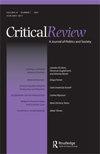左康德完美主义
IF 1.7
3区 社会学
Q4 POLITICAL SCIENCE
引用次数: 3
摘要
摘要后康德早期政治辩论的历史背景揭示了一种新型完美主义伦理的出现,这种伦理不再像18世纪德国的主流倾向那样以国家支持的促进幸福为基础,而是以个人自由为基础。后康德完美主义专注于维护和增强自我定义个体之间正当互动的条件。康德的消极自由不是孤立和疏远,而是基于权利和合法关系的逐步扩展,促成了一种新的社会互动概念。洪堡、席勒、费希特和马克思都是这种新方法的典范,尽管他们之间存在差异。本文章由计算机程序翻译,如有差异,请以英文原文为准。
Left-Kantian Perfectionism
ABSTRACT The historical context of early post-Kantian debates on politics reveals the emergence of a new type of perfectionist ethics no longer based on the state-sponsored promotion of happiness, as the dominant German tendency in the eighteenth century had been, but on individual freedom. Post-Kantian perfectionism focused on maintaining and enhancing the conditions for rightful interaction among self-defining individuals. Rather than isolating and alienating, Kantian negative freedom enabled a new conception of social interaction based on the idea of right and the progressive extension of rightful relations. Humboldt, Schiller, Fichte, and Marx exemplified this new approach, despite their differences.
求助全文
通过发布文献求助,成功后即可免费获取论文全文。
去求助
来源期刊

Critical Review
POLITICAL SCIENCE-
CiteScore
1.30
自引率
12.50%
发文量
17
期刊介绍:
Critical Review: A Journal of Politics and Society is a political-science journal dedicated to advancing political theory with an epistemological bent. Recurrent questions discussed in our pages include: How can political actors know what they need to know to effect positive social change? What are the sources of political actors’ beliefs? Are these sources reliable? Critical Review is the only journal in which the ideational determinants of political behavior are investigated empirically as well as being assessed for their normative implications. Thus, while normative political theorists are the main contributors to Critical Review, we also publish scholarship on the realities of public opinion, the media, technocratic decision making, ideological reasoning, and other empirical phenomena.
 求助内容:
求助内容: 应助结果提醒方式:
应助结果提醒方式:


